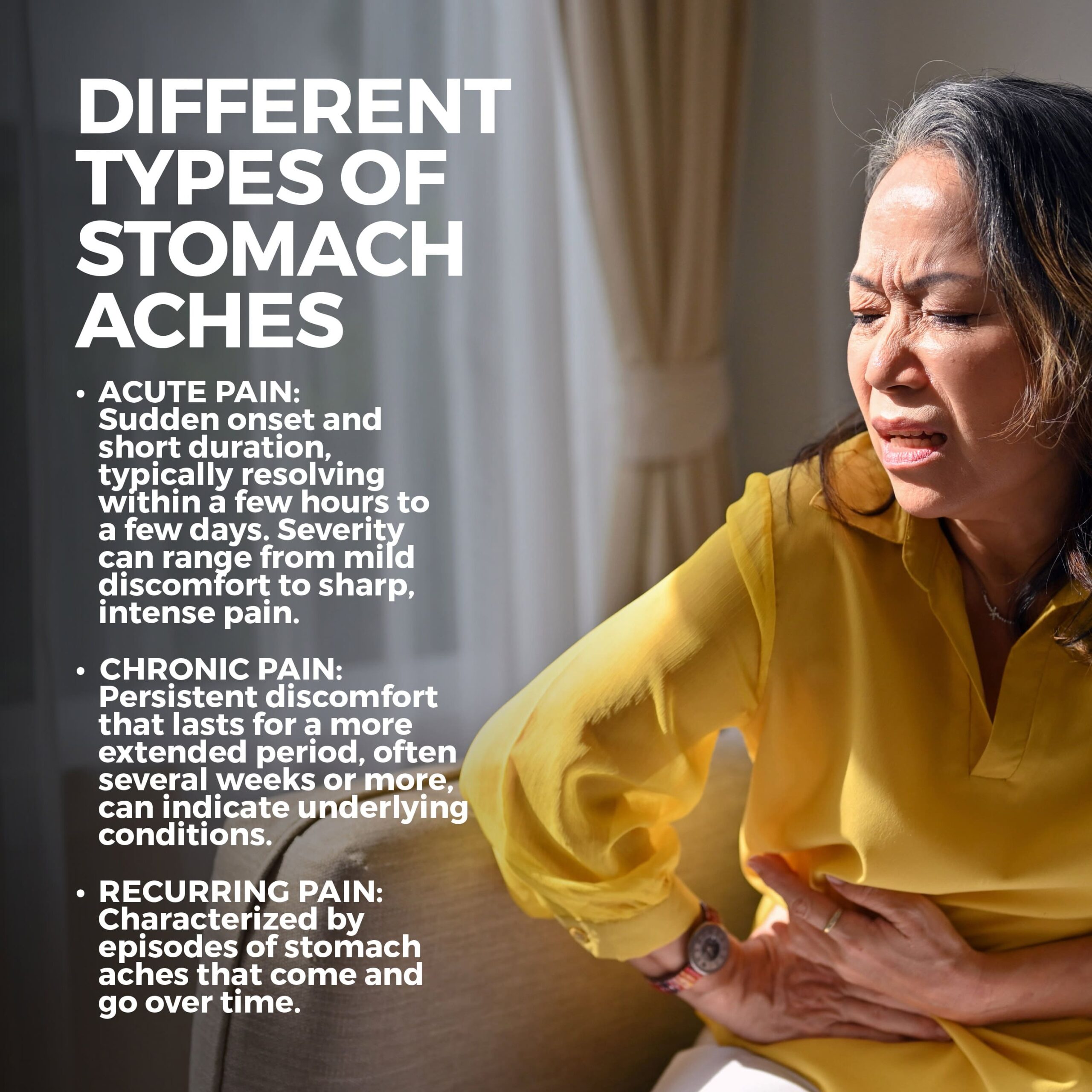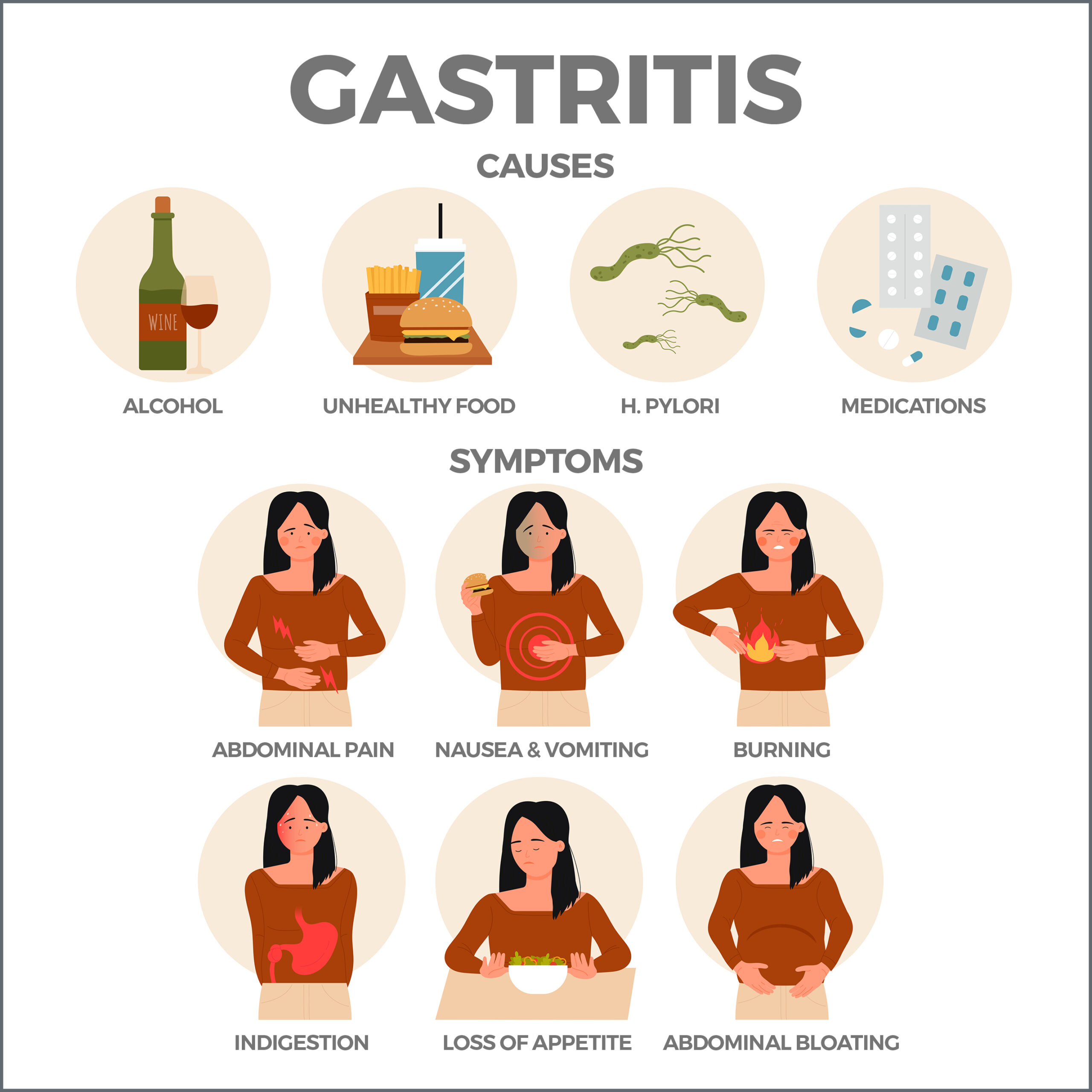
Demystifying Stomach Aches
Stomach aches are a common issue that we all face from time to time. Whether it’s the sudden pangs of hunger, the throbbing discomfort following a large meal, or the persistent and unbearable pain that warrants a visit to the doctor, stomach aches can significantly affect your daily life and well-being. With many factors contributing to these discomforting sensations, understanding the underlying causes and effective management strategies is important. Your gastroenterologist can provide insights and expertise into these concerns and help you navigate toward better digestive health.
Different Types of Stomach Aches
Stomach aches can be broadly classified into three categories:
- Acute Pain:
- Characterized by a sudden onset and short duration, typically resolving within a few hours to a few days.
- Severity can range from mild discomfort to sharp, intense pain.
- Common causes include gas, indigestion, and gastroenteritis.
- Accompanying symptoms such as vomiting, fever, or severe diarrhea can indicate more serious conditions like appendicitis or gallstones.
- Chronic Pain:
- Persistent discomfort that lasts for a more extended period, often several weeks or more, can indicate underlying conditions like gastritis, peptic ulcers, or irritable bowel syndrome (IBS).
- Symptoms can include a dull ache, a burning sensation, or intermittent sharp pains.
- Treatment usually involves addressing the root cause, often requiring lifestyle modifications, medications, or, in severe cases, surgical interventions.
- Recurring Pain:
- Characterized by episodes of stomach aches that come and go over time.
- Often seen in conditions like gastroesophageal reflux disease (GERD), stomach ulcers, or cyclic vomiting syndrome.
- The intermittent nature makes it challenging to diagnose and treat.
- Keeping a symptom diary and noting these episodes’ frequency, intensity, and triggers can provide valuable insights for diagnosis and treatment.

Causes of Stomach Aches
Stomach aches may arise from various conditions. While there are many potential causes of stomach aches, we’ll focus on some more common contributors: digestive issues, food and drink choices, and mental health factors like stress and anxiety. Some common causes include:
Digestive Issues
- Gastritis: This condition involves inflammation of the stomach lining, which can cause pain, nausea, and vomiting. Factors such as long-term use of certain pain relievers, bacterial infection, or heavy alcohol use can trigger gastritis.
- Peptic Ulcers: These are sores that develop on the lining of the stomach, upper small intestine, or esophagus, usually causing a burning stomach pain. They often result from the bacterium H. pylori or from drug-induced injury, such as prolonged use of NSAIDs.
- Gallstones: These hard particles develop in the gallbladder, a small organ under the liver. If gallstones block the ducts leading from the gallbladder to the intestines, they can cause sudden and rapidly intensifying pain in the upper right part of your abdomen.
- Gastroenteritis: Commonly known as “stomach flu,” it’s an inflammation of the lining of the intestines caused by a virus, bacteria, or parasites. Symptoms include stomach pain, vomiting, and diarrhea.

Food and Drink
- Overeating: Consuming food beyond your stomach’s capacity can cause discomfort due to the stretching of the stomach.
- Food Allergies: Certain foods can trigger an immune response, leading to inflammation and pain in the stomach. Common culprits include shellfish, peanuts, and dairy.
- Food Poisoning: Eating contaminated food can lead to an upset stomach, causing symptoms like pain, vomiting, and diarrhea.
- Consumption of Fatty, Spicy, or Gas-producing Foods: These foods can cause indigestion, leading to stomach pain. They can also aggravate conditions like gastritis or peptic ulcers.
Stress and Anxiety
- Stress and anxiety can physically impact your body, including your stomach. Chronic stress can cause gastrointestinal issues, including stomach pain, acid reflux, and even IBS.
- The connection between the brain and the digestive system, often called the “gut-brain axis,” can play a significant role. Anxiety can disrupt this axis, leading to changes in digestion and cause stomach pain.
How to Deal with Stomach Aches
Stomach aches can significantly affect your daily routine and overall well-being. Here are some proven methods to help manage and alleviate the discomfort associated with stomach aches.
Diet and Lifestyle Changes:
- Healthy Eating Habits: Consuming a balanced fiber-rich diet can promote better digestion and reduce the risk of stomach aches. Incorporating probiotics into your diet can also support a healthy gut. Avoid overeating and try to maintain regular mealtimes.
- Regular Exercise: Regular physical activity can stimulate the GI (gastrointestinal) tract muscles, which helps move food through more efficiently. This can reduce constipation and promote overall better digestion.
- Adequate Hydration: Drinking plenty of water throughout the day aids digestion and keeps your digestive tract moving smoothly, helping to prevent constipation and related stomach aches.
- Stress Management: Practice mindfulness, meditation, or other stress-relief techniques to maintain a calm mind. A healthy mind can contribute to a healthy gut, reducing stress-induced stomach aches.
Medications
- Over-the-counter Antacids: These can neutralize stomach acid and provide quick relief for mild heartburn or infrequent acid reflux.
- Proton Pump Inhibitors or H2 Blockers: These medications can reduce the production of stomach acid, which can help heal damaged esophageal and stomach lining.
While these medications can provide relief, they should be used judiciously and under the advice of a healthcare provider. Over-reliance or misuse of such drugs can lead to unwanted side effects or mask more serious conditions.
Self-diagnosis and self-treatment, while tempting, can often lead to misinterpretation of symptoms and inappropriate treatments. If in doubt, always seek medical advice. Remember, a well-timed consultation can make a significant difference in addressing the issue at hand and preventing complications down the line.
Preventing Stomach Aches
Preventing stomach aches can often involve implementing a smart lifestyle and dietary habits. Here are some proactive measures that can help keep stomach discomfort at bay:
- Maintain a Balanced Diet: Consuming fiber-rich foods, lean proteins, and healthy fats can promote better digestion. Be mindful of your consumption of spicy, fatty, or gas-producing foods, as these may cause stomach discomfort in some individuals.
- Stay Hydrated: Drink plenty of water and other fluids throughout the day. Proper hydration aids digestion by helping break down food, allowing your body to absorb nutrients more effectively.
- Portion Control: Overeating can lead to indigestion and stomach discomfort. Aim for smaller, more frequent meals instead of three large meals daily.
- Exercise Regularly: Regular physical activity promotes a healthy digestive system by encouraging normal bowel movements and reducing the chance of constipation.
- Limit Alcohol and Avoid Smoking: Excessive alcohol can inflame the stomach lining, leading to discomfort. Smoking can cause indigestion and exacerbate symptoms of peptic ulcers. Cutting down or eliminating these habits can significantly improve stomach health.
- Manage Stress: High-stress levels can cause many stomach conditions. Use stress management techniques such as deep breathing, yoga, meditation, or any relaxing activity that helps you maintain a calm mind.
- Listen to Your Body: Pay attention to what your body tells you. If certain foods or habits consistently lead to discomfort, consider eliminating them and discuss these patterns with your gastroenterologist.
While these strategies can significantly reduce the risk of experiencing stomach aches, they may not prevent all types of stomach discomfort, especially those caused by underlying medical conditions. If you’re frequently experiencing stomach pain, it’s essential to consult your gastroenterologist for an accurate diagnosis and appropriate treatment plan.
Contact Us
While stomach aches are a common concern, understanding their nature, causes, and management can equip us to handle them better. Contact us today! The team of professionals at GastroMD looks forward to working with you. We are one of the leading gastroenterology practices in the Tampa Bay area. We perform many diagnostic procedures using state-of-the-art equipment in a friendly, comfortable, and inviting atmosphere where patient care is always a top priority!



